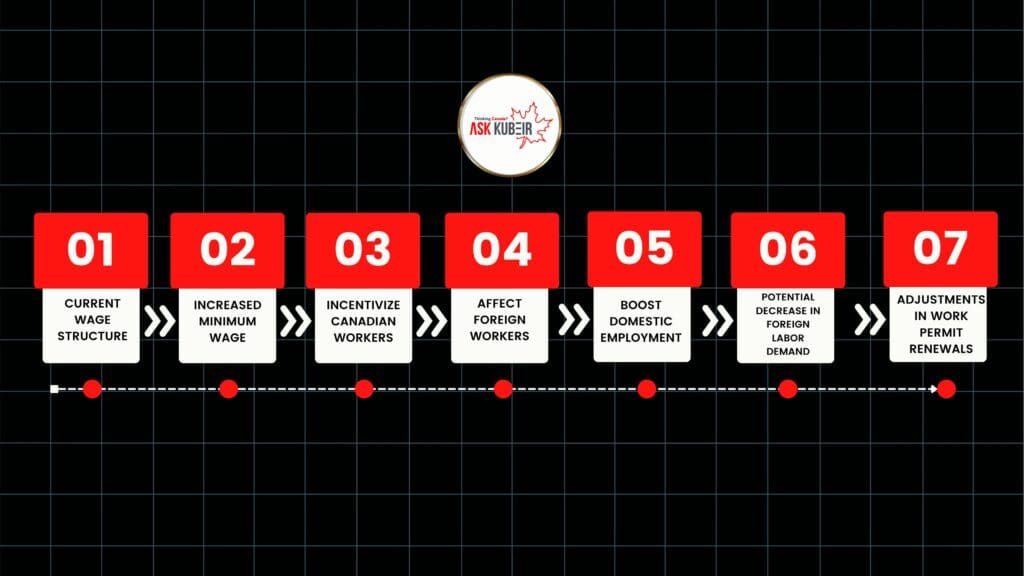
The Canadian federal government is set to implement a significant change to the Temporary Foreign Worker (TFW) program, specifically within the high-wage stream. On November 8, 2024, new rules will come into force, raising the minimum hourly wage that employers must offer to temporary foreign workers. This move aims to encourage the hiring of more Canadian workers while simultaneously responding to criticisms surrounding the program. In this article, we will explore these changes in depth and analyze their potential impact on the labor market and foreign workers.
The TFW Program’s High-Wage Stream: Key Changes
The Temporary Foreign Worker (TFW) program allows Canadian employers to hire foreign nationals when there are no qualified Canadian workers available. The high-wage stream of this program applies to jobs that offer salaries above the provincial median wage. To ensure that foreign workers are not underpaid, employers must meet or exceed this wage threshold as part of their Labour Market Impact Assessment (LMIA) applications.
Upcoming Wage Increase
On November 8, 2024, the minimum wage requirement under the high-wage stream will increase by 20% above the provincial median hourly wage. This change is designed to make the cost of hiring foreign workers less attractive, thereby encouraging employers to prioritize Canadian candidates. Let’s take a closer look at how these changes will be applied across various provinces:
Example of Ontario
- Current Median Wage: $28.39/hour
- New Minimum Wage Requirement: $34.07/hour
This 20% increase will have wide-reaching implications for both employers and temporary foreign workers, especially in provinces with higher median wages.
Why Is the Government Raising the Wage Threshold?
The Liberal government’s decision to raise the wage threshold for foreign workers stems from multiple factors. Public pressure regarding the high number of temporary foreign workers in Canada has been mounting, with critics linking the increase in foreign labor to housing shortages and rising living costs. By raising the wage threshold, the government aims to reduce reliance on foreign workers and promote the hiring of Canadian citizens and permanent residents.
Encouraging Domestic Employment
A core objective of the policy change is to incentivize employers to hire Canadian workers. With the higher wage requirement for foreign workers, many employers may find it more cost-effective to invest in hiring and training local employees. This strategy aligns with the government’s broader goal of reducing unemployment and strengthening the Canadian labor market.
Impact on Temporary Foreign Workers
The upcoming wage increase will likely affect thousands of temporary foreign workers. Based on estimates, up to 34,000 foreign workers under the high-wage stream will see wage adjustments. While the wage hike itself could improve compensation for those workers, the long-term implications may involve a reduced demand for temporary foreign labor.
Work Permit Renewals
Although existing work permits are not directly impacted, the planned wage increase will affect renewal applications. Employers will need to comply with the new wage requirements when renewing permits, which could make it harder for temporary foreign workers to maintain their jobs in Canada.
Exemptions for Agricultural Workers
One sector notably exempt from these changes is agriculture. Agricultural workers are not subject to the same wage increases, given the unique labor demands and challenges of this industry. However, for sectors outside of agriculture, including manufacturing and services, employers will have to adjust to the new wage rules.
Broader Trends in the Temporary Foreign Worker Program
The wage increase is the latest in a series of tightening measures aimed at curbing the number of temporary residents entering Canada. Other recent policy shifts include:
- Caps on low-wage foreign workers: Some industries now have caps limiting the percentage of low-wage foreign workers that can be hired.
- Restrictions in high-unemployment regions: Permits for temporary foreign workers are no longer issued in metropolitan areas where unemployment rates are high.
These reforms reflect the government’s desire to ensure that the Canadian labor market remains sustainable and that opportunities for local workers are maximized.
The Growing Number of Temporary Foreign Workers
Despite tightening restrictions, the number of temporary foreign workers in Canada has been rising. Public data from Immigration, Refugees, and Citizenship Canada (IRCC) shows that 183,820 temporary foreign worker permits became effective in 2023, marking an 88% increase since 2019. This upward trend raises concerns about how further changes, like the wage hike, will impact the broader immigration landscape.
How Employers Can Adapt to the New Rules
Employers who rely on temporary foreign workers will need to prepare for the new wage rules by adjusting their budgets and recruiting strategies. Here are some steps that businesses can take to adapt:
- Review Current Wages: Ensure that all wages for foreign workers under the high-wage stream meet the new threshold before the November 8 deadline.
- Explore Domestic Talent: Invest in local recruitment efforts and job training programs to attract and retain Canadian workers.
- Renew Work Permits: Plan for the renewal of work permits, ensuring that wage offers comply with the new requirements.
Employers must also remain aware of any further changes to the TFW program and stay proactive in adjusting their labor practices.
Conclusion
The upcoming increase in minimum wages for temporary foreign workers in the high-wage stream represents a significant policy shift by the Canadian government. Designed to encourage the hiring of Canadian workers, this change will have far-reaching effects on employers, foreign workers, and the broader labor market. As these new rules come into effect, businesses will need to adapt to maintain compliance while considering the future of their workforce.

With November 8 fast approaching, it is crucial that businesses start preparing for the wage changes to ensure smooth transitions and continued success in the Canadian labor market.
Don’t hesitate to reach out us AsKubeir for expert guidance and personalized support. Let us help you turn your career goals into reality and start your new chapter in Canada with confidence!
CONTACT US!
📞 Call us: 04 526 4646
📲 WhatsApp: wa.me/971529693030
🌐 Website: www.askkubeir.ae





